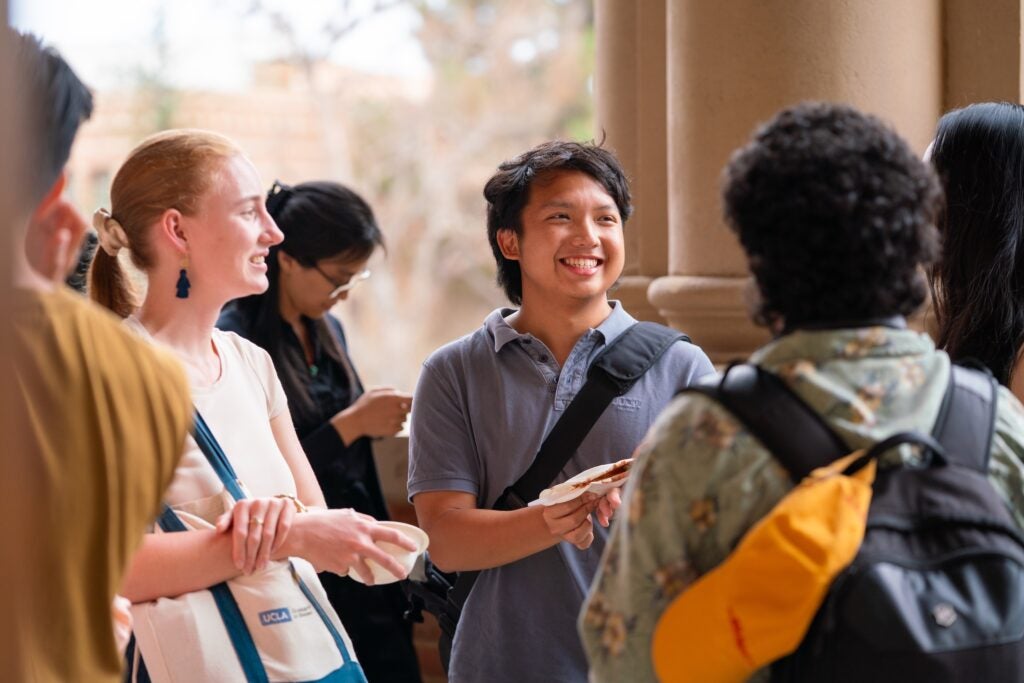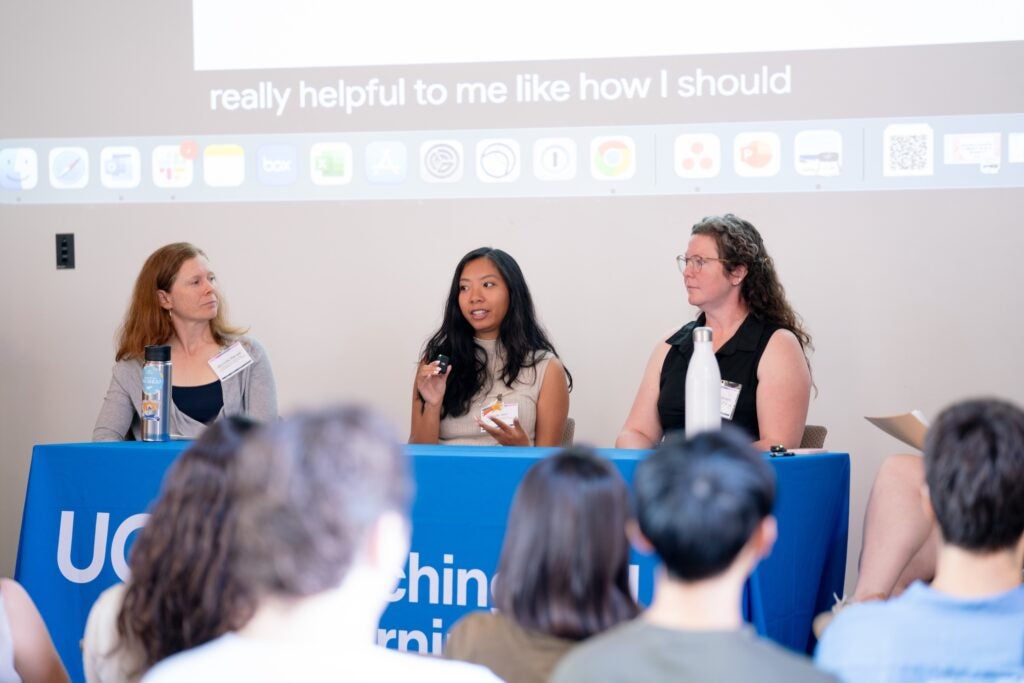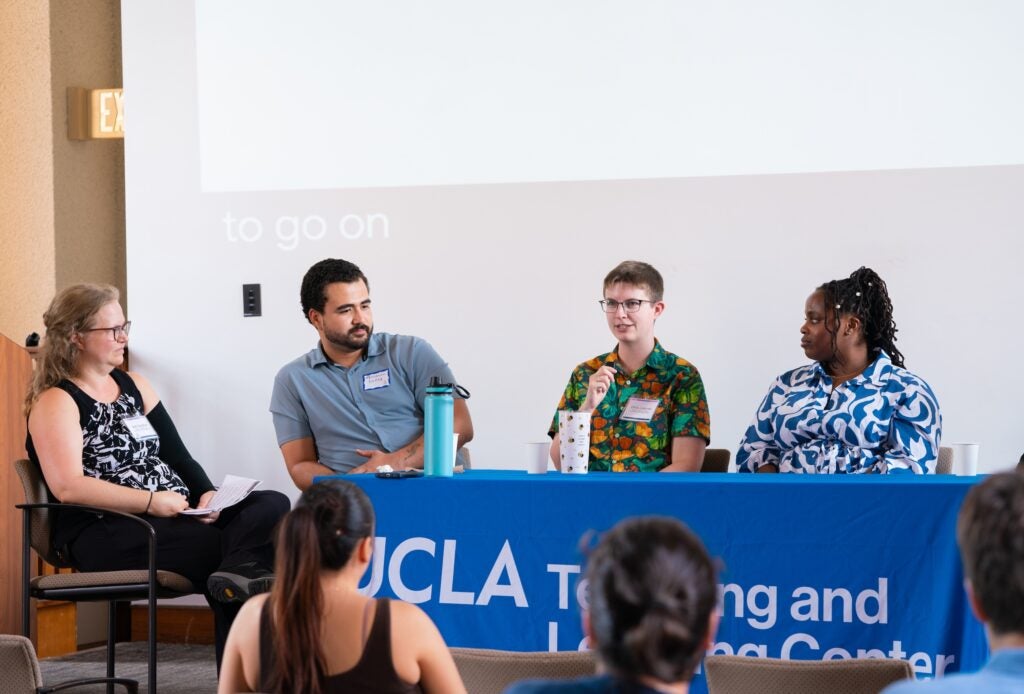Panelists hold a discussion during a session on the changing landscape of university teaching.
An excited group of graduate students and postdoctoral scholars shuffled between classrooms in Royce and Haines Halls this September, filled with enthusiasm for the start of the quarter. They were part of the 52nd annual TA & Postdoc Teaching Conference, a two-day program designed to help TAs and postdocs develop instructional practices hosted by the UCLA Teaching and Learning Center (TLC). Through presentations, workshops, and panel discussions attended by more than 160 TAs and postdocs, the conference showcased innovative teaching strategies and connected participants with campus resources.
This year’s conference expanded its scope to highlight postdocs as well as welcome both incoming and returning TAs. The organizers hoped sessions would appeal to participants with varied teaching experience and designed programming blocks to include two concurrent offerings — one geared toward newer instructors and another designed for those with more experience
“A key goal was to ensure that participants — regardless of their role or level of experience — could find opportunities to grow,” noted Elyse Gueidon, Associate Director for Graduate Student Professional Development and an organizer of the conference. “We also emphasized peer-to-peer learning and encouraged attendees to connect their teaching development to broader career goals.”

Programs offered during the TA & Postdoc Teaching Conference focused on fostering a collaborative culture between TAs and instructors. The keynote address featured a fireside chat between members of the teaching team for the Biotechnology and Society Cluster, a yearlong interdisciplinary course where first-year students examine ethical, social, and political aspects of biotechnology.
The TA and instructor panelists noted how regular team check-ins helped them establish resilient teaching partnerships. Chloe Bell-Wilson, a Ph.D. candidate in the History of Science, Medicine, and Technology, and Kyla Yein, a Ph.D. student in Cinema and Media Studies, both highlighted how team lunches allowed the group to build trust to feel comfortable asking each other for help. For Michelle Rensel, Associate Teaching Professor for Society and Genetics, who was the cluster’s instructor of record, it was crucial to make the appropriate space for TAs to embrace imperfection and receive feedback.
“It takes time to build that culture of being willing to share and be vulnerable,” she emphasized.

The Conference also offered opportunities to learn concrete instructional practices. Brief flash talk sessions showcased teaching strategies fellow graduate students and postdocs implemented to enhance student learning and address instructional challenges. Naomi Stephen, a Ph.D. student in Education, discussed how structured check-ins during class sessions can help TAs get to know students and build trust. By having participants complete a digital check-in themselves, the talk offered example questions to use and practical ideas on how to build community in a course.
“I hope attendees learned how to leverage short amounts of time in class to build community with students through asking questions that address both class content and student well-being,” Stephen noted.
Attendees appreciated how sessions highlighted the ways that TAs and Postdocs might help make students feel more welcome in courses to improve learning outcomes. For instance, Jessica Huerta, a Ph.D. candidate in Sociology, found a session highlighting conversational strategies to use during office hours especially valuable.
“Knowing what office hours mean is part of the hidden curriculum,” she noted, referencing the implicit expectations within higher education that students might have varying understandings of based on their backgrounds.“Helping students understand that this is time allotted to help them understand their learning processes or to share tips and tricks are all things that teaching assistants and professors can assist with.”
Beyond gaining these practical strategies for classroom instruction, Gueidon and other organizers wanted the conference to highlight the resources available to TAs and Postdocs throughout the academic year.
“We hope participants left with a deeper sense of connection — to their peers, to the broader teaching community, and to the idea that they’re not navigating instruction alone,” she emphasized. “Whether they’re graduate students or postdocs, we wanted them to feel supported by a network of fellow educators, faculty, and mentors who can serve as thought partners as they grow in their teaching roles.”
